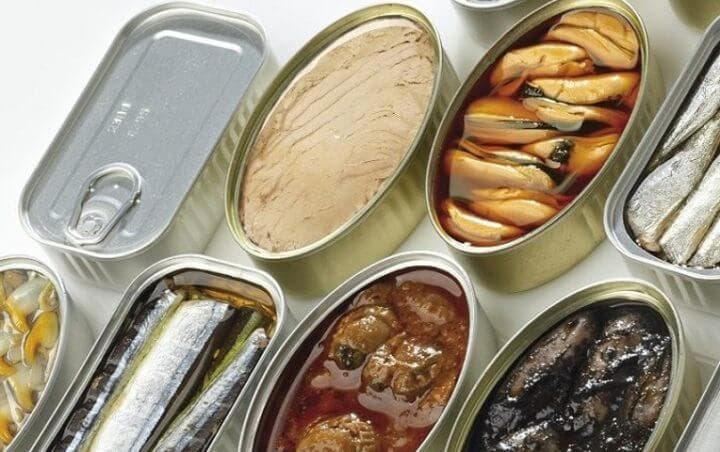Opinions on canned foods are contradictory and diverse. Some people claim that they are the best products on the market while others claim that they should be avoided at all costs.
The reality is that canned food is part of many diets and the information about its nutritional properties or benefits is not as clear as we would like. Maybe you are missing the opportunity to include an amazing product in your life just because of the opinion of others or you are avoiding a big mistake.
Therefore, we propose to explain everything about it, from its components to its advantages and disadvantages, so that you can make the best decision regarding your health.

What is canned food?
The main feature that sets canned food apart from others is its airtight packaging, which is a method of preserving food for a long time without spoiling. It was created especially for the purpose of providing stable food for soldiers and sailors in the wars of the 18th century.
The processes for each canned product may vary slightly, but there are generally 3 main steps:
- Processing: food is peeled, cut, shelled or cooked.
- Sealing: processed food is sealed in cans.
- Heating: the cans are heated to kill any harmful bacteria and to prevent spoilage of the food.
Thanks to all these functions, canned food can be kept safe for consumption from 1 to 5 years or a little longer, depending on the product. You can find commonly from fruits, vegetables, beans, soups, meats and even canned seafood.

How does canning affect nutritional levels?
The common conception thinks that canned food is less nutritious than fresh or frozen, but in reality canning preserves these nutrients better than any other method.
Proteins, carbohydrates and fats are not affected by the process and, in addition, many minerals and fat-soluble vitamins are also preserved, such as vitamins A, D, E and K. Studies in this regard indicate that foods high in certain nutrients maintain them through the canning process (Cameron, Pilcher and Clifcorn, 1949).
However, other studies have found that vitamins C and B can become damaged due to the high temperature involved in the process (Rickman, Barrett and Bruhn, 2007). On the contrary, some components can be increased due to the same process, such as the antioxidants in canned tomatoes; hence the benefits of canned goods continue to be successful.

Is canned food convenient?
Canned food products are not only convenient, but they are also inexpensive and practical to use. In many cases, it is an excellent solution for taking food to places where obtaining food is a difficult task or to communities where the safety of food is a concern.
Fortunately, this type of product can be stored for years even, so you can consume it when it suits you best.
Disadvantages of canned food
1. May contain BPA (Bisphenol A)
Bisphenol A is a chemical commonly used in food packaging, in this case in cans. The concern in this regard is that this BPA is transferred from the lining of the can into the food inside.
In fact, one study looked at 78 canned goods and found BPA in 90% of them. Additionally, other research has shown that eating canned foods exposes you to BPA (Noonan, Ackerman & Begley, 2011).
The evidence in this regard is varied but some research has linked BPA to health problems such as; heart disease, type 2 diabetes, and male sexual dysfunction (Schecter et al., 2010).
If you want to stay away from BPA exposure , eating too many canned goods is not the best decision.

2. May contain deadly bacteria
Although extremely rare and very rare, canned foods can contain a dangerous bacteria called Clostridium botulinum if they were not processed correctly. This is very serious, since consuming it can cause botulism , a disease that can lead to paralysis and death if not treated quickly. However, most cases of botulism come from foods that are canned at home; while in stores it rarely happens.
Try not to consume those cans that are broken, dented or leaking to prevent this disease.
3. Some contain added salt, sugar, or preservatives
During the canning process, factories sometimes decide to add a little salt, sugar, and preservatives to food products. This may not be a concern for many, but for those with high blood pressure it can be problematic. In addition, excess sugar has harmful effects for you, since it is linked to many diseases such as; obesity, heart and type 2 diabetes.
Also note that added preservatives can come from natural or chemical sources.

conclusion
Whenever canned food, first read the label where the ingredients and nutritional values are presented to make sure you are making the right decision. This way you can avoid the options with extra salt, sugar and preservatives.
References
- Cameron, EJ, Pilcher, RW and Clifcorn, LE (1949). Nutrient Retention During Canned Food Production. Am J Public Health Nations Health. doi: 10.2105 / ajph.39.6.756
- Noonan, GO, Ackerman, L. K and Begley, TH (2011). Concentration of bisphenol A in highly consumed canned foods on the US market. Journal of agricultural and food chemistry. doi: 10.1021 / jf201076f.
- Rickman, JC, Barrett, DM and Bruhn, CM (2007). Nutritional comparison of fresh, frozen and canned fruits and vegetables. Part 1. Vitamins C and B and phenolic compounds. Journal of the Science of Food and Agriculture. doi: 10.1002 / jsfa.2825
- Schecter, A., Malik, N., Haffner, D., Smith, S., Harris, TR, Paepke, O. and Birnbaum, L. (2010). Bisphenol A (BPA) in US food. Environmental science & technology. doi: 10.1021 / es102785d
